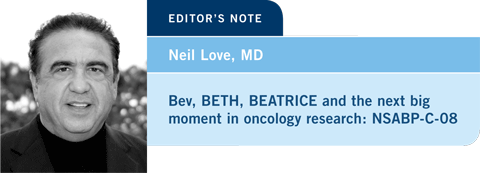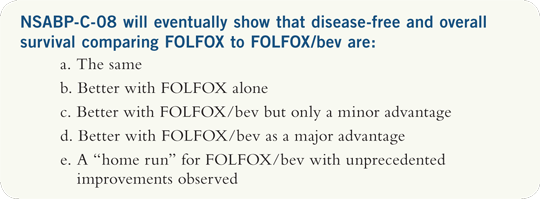
 |
||||||||

It’s Saturday afternoon at the gym, and I climb on an ellipse machine with my iPhone (which doubles as an iPod) ready for another audio adventure. I pop in some earphones and take notice of the surrounding television monitors that are filled with sound bites from silly politicians with fabulous hair and beautiful clothes.
The weekend warriors around me have no idea of the extreme content about
to be pumped into my cortex, and I hit “play” in iTunes to find Antonio
Wolff presenting a case from his practice during our most recent breast cancer
Think Tank. The patient, who is a mother of two teenage children, has rapidly
progressive visceral metastases six months after receiving adjuvant dose-dense
AC![]() T for a triple-negative tumor with one microscopic positive node.
T for a triple-negative tumor with one microscopic positive node.
Antonio’s anguish quickly infects the other faculty members as he describes the crushing depression that engulfed his entire staff the day this woman showed up in a wheelchair with massive anasarca from advanced liver mets.
Hy Muss makes a gentle jibe that situations like this are “two cocktail” nights, and John Mackey notes that he always makes sure there are plenty of tissue boxes in his exam rooms, both for him and his patients.
Gliding along on my machine, I see the sweaty Zumba® class attendees filing out and wonder if any of these women will someday be in the same desperate situation as Dr Wolff ’s patient. As I continue to listen, Antonio describes how his patient’s tumor responded dramatically to anti-angiogenic therapy in the form of bevacizumab and some recycled paclitaxel but now, six months later, the disease was again progressing, and he was unsure of his next move. Although investigators in other tumor types generally turn to breast cancer as the role model for clinical research and progress, cases like this one remind us that for all our new biologic options and chemo choices, metastatic breast cancer is usually far from chronic, and most patients do not survive five years.
The FDA recently approved the use of bevacizumab for patients with breast cancer, but let’s be realistic: Bev for any metastatic solid tumor ain’t no imatinib for CML, which is the reason that all eyes are on the adjuvant setting. In that regard, there is a sleeping giant in the spare bedroom who will soon wake up and let us know if this treatment strategy can save a few or maybe many of our mothers, sisters, wives and daughters, and for that matter, our brothers, fathers, husbands and sons.
As is often the case, the NSABP holds the ticket, and the show is about to begin — specifically, the unfolding of results from NSABP trial C-08, comparing FOLFOX to FOLFOX/bev as adjuvant therapy for colon cancer. The international AVANT study also holds this answer, but C-08 is closer to reporting. As discussed by Mike O’Connell on our colon cancer series, the C-08 safety data will be presented at ASCO in June (adjuvant bev is relatively safe, at least in the short run) and the efficacy data will be reported no later than fall 2009, and possibly earlier, as the data monitoring committee continues to review the findings.
I can’t convince any investigator in the fertile bev research fields of breast, colon, lung, renal and ovarian cancer and, yes folks, malignant glioma to hazard a guess about what we’ll see in the adjuvant setting with this interesting agent. How about you?

You and I will guess “c” because we’ve seen it before and we think we understand the disease. In any event, for all the grandeur and “astonishment” at ASCO 2005 with the adjuvant trastuzumab data explosion, adjuvant bev trials like C-08 offer the opportunity to impact quantum numbers more people than the modest 20 to 25 percent of the breast cancer population (or maybe more according to Soon Paik) affected by adjuvant trastuzumab.
With the hope and expectation that bev works in the adjuvant setting, researchers around the world have launched a panoply of other studies. In breast cancer, this includes BETH, a combined effort of the CIRG and NSABP comparing TCH to TCH/bev in HER2-positive disease, and BEATRICE, a nouveau-style CIRG study of dealer’s choice adjuvant chemo with or without bev in triple-negative breast cancer. ECOG also has trial 5103 in HER2-negative disease, evaluating adjuvant chemo alone or with bev, which complements their major adjuvant non-small cell lung cancer bev study (1505), and the list continues in other tumors.
The quiet before the C-08 storm takes me back to one of the most memorable interviews of our 20 years of querying investigators — in February 2005 with Dr Edith Perez. It is difficult to remember that at that point, adjuvant trastuzumab was still a faint glimmer in our minds. No one had any idea when these trials would report, and the widespread feeling was that it would be years before there were answers.
In the interview, Dr Perez knocked my socks off by announcing that the NCI and the two US cooperative groups with major adjuvant trastuzumab trials “cooking in the oven” (NCCTG and NSABP) had just decided to speed up the timetable by combining data from the two studies into an unplanned efficacy analysis. I asked Dr Perez when this look-see would be performed and heard the shocking answer that the analysis was to be conducted during the following two months and presented at ASCO that May.
ASCO? Are you serious? We are going to find out about these studies now!
Within three weeks, we had published this interview “alert” hoping that docs would know that ASCO 2005 would be a very interesting event, and sure enough, on my birthday, April 26, the most stunning press release in oncology history documented the unprecedented effect of adjuvant T, and at ASCO, Edith was right up there on the podium as a presenter.
It is interesting to note that in 2005, when ASCO set up a last-minute “education session” chaired by George Sledge to present these landmark findings, not only were the NSABP, NCCTG and HERA trastuzumab trials presented but also on the docket was Kathy Miller reporting for the first time the findings from ECOG trial 2100 evaluating paclitaxel/bevacizumab in first-line metastatic disease. Almost three years later, this intervention has regulatory approval, and we will soon learn whether anti-angiogenesis (or however bev works) is effective as adjuvant therapy, at least in colon cancer.
Whatever the results of C-08, and the trials that will follow, these studies will profoundly affect the oncology landscape and lead to a series of important new challenges that will be quite different depending on what happens. If C-08 does a belly flop and shows no benefit with bev, how will accrual to the huge adjuvant trials in other tumors fare? And how will we feel as a society footing yet another substantial palliative care expense?
On the other hand, if C-08 shows trastuzumabian efficacy, will docs want to use adjuvant bev off study in other tumor types, and will we be able to complete accrual to trials in these tumors? We still will be spending a fortune to block VEGF, but this time with curative intent and, more importantly, there will be further proof that molecular targeted therapy — even if we aren’t quite sure what the target is — may truly be able to help us move forward out of the current quagmire in every oncology office on the planet.
— Neil Love, MD
DrNeilLove@ResearchToPractice.com
April 22, 2008
EDITOR'S NOTE
Bev, BETH, BEATRICE and the next big moment in oncology
research: NSABP-C-08
Neil Love, MD
- Select publication
INTERVIEWS
Daniel F Hayes, MD
- Select publications
John F Forbes, MD
- Select publications
Julie R Gralow, MD
- Select publications
John F R Robertson,
MB, ChB, BSc, MD
- Select publications
Roundtable Discussion
- Select publications
Breast Cancer Update:
A CME Audio Series and Activity